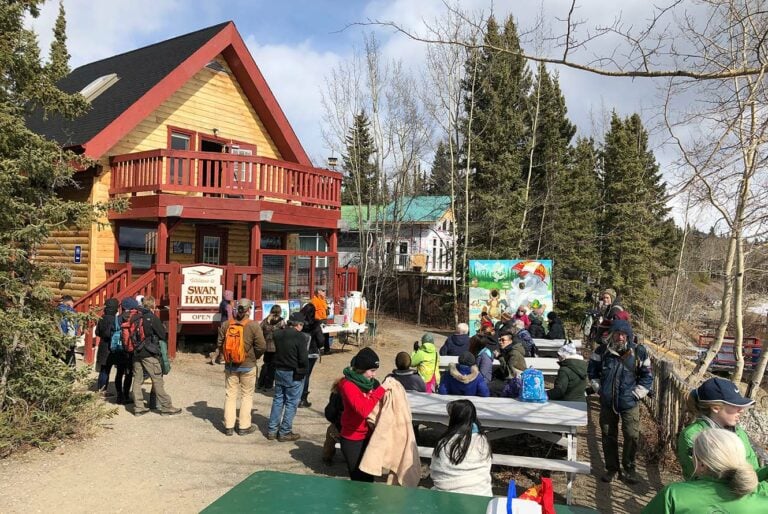By Amy Kenny
Forgive the pun, but Joyce Majiski’s Song of the Whale has had a ripple effect at the Yukon Arts Centre. In January, children, adults and school groups flocked to YAC, sometimes for multiple visits, to see the life size humpback whale skeleton Majiski spent the last year carving from discarded Styrofoam.
This February, it will be the centrepiece of YAC’s World Whale Day festival—a one-day event packed with whale-related workshops, performances and talks for local artists of all disciplines.
“We always planned to try to really try to break down the silos between the gallery and performing arts, to try to engage with the gallery any way that we can,” says Michele Emslie, director of programming at YAC. “So when World Whale Day came up, it was serendipitous.”
The events, taking place at YAC on Feb. 20, include workshops.
Local artist Leslie Leong is leading a workshop in making art with recycled plastics, while Blake Shaa’koon Lepine has come up with a Tlingit whale design, which participants can use to print onto reusable shopping bags being provided. There is a show with children’s entertainer Remy Rodden and a snow sculpture of a humpback whale will be at the front of the arts centre.
In the evening on the mainstage, Daniel Janke will join Joyce Majiski for a panel talk. Majiski will talk about how her sculpture came together, and about the issue of plastics polluting the oceans. Janke will discuss the soundtrack he created for the exhibit followed by a short performance. A representative from the Surfrider Foundation, will also speak via Zoom. She will talk about plastic pollution in the oceans and the solutions to fixing the problem.
Tickets are free, but people must register online as space is limited. Some workshops and events have already filled up, something Emslie finds unsurprising. On the surface, mountain-dwelling Yukoners might not seem to have the same connection to whales as they do to bears, or caribou, but there’s something about them.
“I think that whales are this mysterious being to us, but then because they have song and language and they live in family groups, it somehow connects us to them even if we don’t live next to the ocean,” says Emslie.
She also says that those who remember the 70s and 80s, when people came together to offer protections to whales, many of which were at risk and endangered at the time, have a sense of pride about that. Whales serve as a reminder that we can do something when it comes to environmental issues.
Majiski agrees. She’s thrilled that her work has acted as a jumping-off point for people to think more about the impact we have on the world. Art can engage people emotionally, she says, and that can make them think outside the gallery walls.
“It doesn’t matter what the art form is, it’s like ‘wow, you saw what I was doing and then you had your own reaction to it and took the next step to tell your friends to go see it, or to consume less, or try living in a different way.’”
She says it’s been even more interesting to exhibit this work during COVID, at a time when it’s impossible to ignore how capable we are of change, even when it’s difficult.
“We spend a lot of time as humans thinking about all the ways we can’t change. We have to invest in oil because it’s what we use and it would be so much trouble to change it,” she says. “And then COVID happened and things had to change and look what we can do if we have to and we want to. For me, it was this illustration that we can do whatever we want if we want to.”
For more information and to register for events, visit yukonartscentre.com
On Feb. 22, Australian writer Rebecca Giggs will talk via Zoom about her book, Fathoms: the World in the Whale, which won the 2020 Andrew Carnegie Medal for Excellence in Nonfiction. The lecture will be on the big screen at the Yukon Arts Centre. Get your free tickets here.


